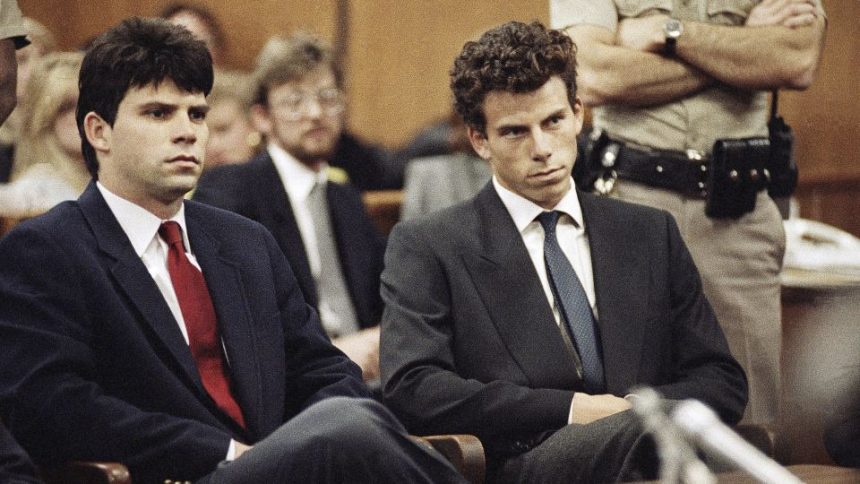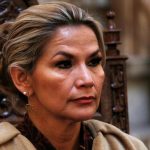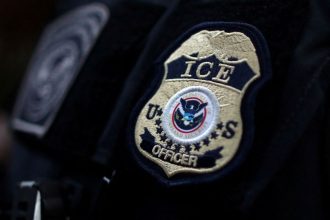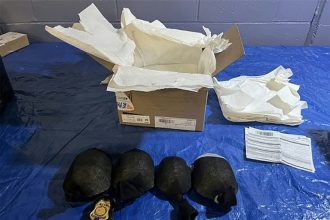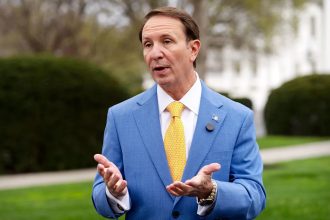A California parole board has denied parole for Lyle Menendez, who was convicted alongside his brother of murdering their parents in 1989.
The parole board also denied Erik Menendez parole Thursday. The decisions are a crippling blow to both brothers after a yearslong fight for release.
Despite the board’s ruling, Lyle Menendez still has hope of walking free. California Gov. Gavin Newsom has the rare power to reverse parole decisions, and the brothers are separately seeking clemency and a new trial.
The decision was delivered Friday after a virtual hearing involving statements from the Los Angeles District Attorney’s Office, Lyle Menendez and supportive Menendez relatives – who are also considered victims of the brothers’ crime.
Parole Commissioner Julie Garland said while delivering the decision that Lyle needs to be the person he shows he is while running inmate programs.
“We find your remorse is genuine. In many ways, you look like you’ve been a model inmate,” she said. “You have been a model inmate in many ways who has demonstrated the potential for change. But despite all those outward positives, we see … you still struggle with anti-social personality traits like deception, minimization and rule breaking that lie beneath that positive surface.”
While the commissioners denied his parole at this juncture, Garland told Menendez, “don’t ever not have hope,” as the denial is “not the end.”
“It’s a way for you to spend some time to demonstrate, to practice what you preach about who you are, who you want to be,” she said. “Don’t be somebody different behind closed doors.”
Lyle Menendez may be eligible for parole again in three years, but as part of the decision, Garland said he will be considered for “administrative review” within a year and could be moved up to a second parole hearing in as little as 18 months.
The parole board’s decision is not final; It could undergo an internal review for up to 120 days. After that, Newsom has 30 days to affirm or reverse the decision, if he so chooses. The same is true for Erik’s case as well.
The parole hearings were part of several attempts by the brothers to get the justice system to reevaluate their case, as understanding of child sexual abuse has evolved over the years. While this path is temporarily halted for the next three years, the brothers are still working on a legal challenge in the hopes of getting a new trial, and have an active clemency application with Newsom’s office.
The 36th anniversary of José and Kitty Menendez’s murders passed earlier this week. On August 20, 1989, the two brothers rushed into the den of their family’s Beverly Hills home and shot and killed their parents with multiple bullet wounds. The brothers have long said they killed their parents out of fear after a lifetime of abuse from them, especially their father.
A photo of Lyle Menendez during his California Board of Parole hearing Friday. – CDCR
Friday’s 11-hour hearing spent a large amount of time on the abuse Lyle and his brother have said they endured, and the actions leading up to and after the murder of their parents. Lyle said experiences from his childhood and the aftermath of his parents’ murders left a deep and glaring hole in his life, which he says he tried to fix through his good deeds in prison.
“My life has been defined by extreme violence. I wanted to be defined by something else,” Lyle said Friday as tears gathered in his eyes.
His voice strained, he spoke of the pressure he put on his family, who were subjected to terrible grief.
“It’s the anniversary of a crushing day for so many in my family … I think about all the phone calls on that day with the shattering news and the loss and the grief,” he said during his closing statement. “Despite all of this, they are still here, showing up for me, disrupting their lives, dealing with public scrutiny … and I will never deserve it.”
“I am so sorry to everyone, and I will be forever sorry,” he added.
Los Angeles District Attorney Nathan Hochman celebrated the decisions by the parole board, saying it lines up with the opinion of his office after reviewing the case.
“If these two brothers are going ahead and violating the rules inside the prison in a structured environment, if they keep failing for 30 years to acknowledge the full extent of their crime, how can we trust them on the outside to abide by the rules?” Hochman told CNN’s Laura Coates Friday.
Parole commissioners question Lyle about abuse and murders
Lyle described his relationship with his father, who he said sexually abused him from ages 6 to 8, as “confusing, caused a lot of shame in me.”
“That pretty much characterized my relationship with my father,” he said.
Lyle said his father treated him as “the special son” in the family, while Erik was considered “the castaway,” as he often got in trouble starting around age 3 or 4.
José Menendez “expected greatness,” Lyle said of his father. “He spent a lot of time talking about the lineage of the family. Lions vs. sheep. Everyone else is sheep and we come from a lion bloodline.”
He said his father stopped sexually abusing him after he asked his cousin Diane if he could sleep in her room, explaining that his father was touching him. But when the abuse stopped, Lyle said it took him a while “to realize that it stopped,” and “there was no discussion about it.”
Lyle then grew emotional, his voice shaking when he explained, “I worried a little bit that I was going to be less loved.”
“I wanted to believe my father loved me, so in my mind I felt like he was a great man, and my main way of dealing with it was that it was just a sickness that some great men have,” Lyle said. “It happened when I was a little kid, and it was over. Burying the emotions was a big thing for me.”
He also discussed that his mother sexually abused him, which he had previously alleged following the murders but was dismissed by prosecutors as part of a web of lies. Parole Commissioner Julie Garland noted the claim is not in the comprehensive risk assessment.
“Today, I see it as sexual abuse. When I was 13, I felt like I was consenting and my mother was dealing with a lot, and I just felt like maybe it wasn’t … it’s abusive, but I never saw it that way, in the same way,” Lyle said. He added the doctors doing his risk assessment “didn’t ask,” so he “didn’t volunteer.”
Erik was regularly punished around ages 3 and 4, as he cried often and was stressed, Lyle said. He said Erik was “openly punished, spanked, viciously. Thrown against things. My mother would drag him down the hall.”
Lyle said he loved Erik, and taking care of him gave him a purpose.
Lyle continued to stay in a protector role, he said, which is why he was with Erik during one of the burglaries. He denied claims that he was “strapped for cash,” saying he had an open credit card and access to bank accounts.
When talking about the topic of disinheritance, Lyle said his therapist, Dr. Jerome Oziel, was told by their father that he and Erik were taken out of the will. The disinheritance wasn’t a motive for the killing, according to Lyle, but he said it did become “a problem afterwards” as the brothers were worried about having no money.
Garland asked him if the murders were planned. Lyle responded they bought the guns, which “made it more likely,” but noted he didn’t purchase the weapons specifically to plan his parents’ death.
“I thought it was de-escalating … it gave me some measure of safety,” he said, adding that buying them was “the biggest mistake.”
Lyle said his father made “serious threats” about “if it ever got out,” presumably referring to the alleged abuse. But after the murders, he said he had feelings of regret and shock, and experienced “zero relief.”
“I felt this shameful period of those six months of having to lie to relatives who were grieving just very much affected me. I felt the need to suffer. That it was no relief … I sort of started to feel like I had not rescued my brother. I destroyed his life. I’d rescued nobody,” he said.
Phone violations a point of dispute for parole commissioner
Deputy Parole Commissioner Patrick Reardon also addressed several of Lyle’s rule violations in prison, specifically his use of an unauthorized cell phone, which he was caught with several times. The cell phone use is considered dangerous because it can be used for criminal activity like ordering hits, moving drugs in prison or coordinating attacks on an officer, he added.
Lyle said he used the phone to stay in touch with his family and community.
“I had convinced myself that this wasn’t a means that was harming anyone but myself in a rule violation. I didn’t think it really disrupted prison management very much,” he said, adding he can get so focused on service work that he overlooks how it gets done.
Reardon asked how Lyle sees his good work and education history, as well as work in the prison, with the fact that he blatantly violated the cell phone rules.
“I would never call myself a model incarcerated person. I would say that I’m a good person, that I spent my time helping people. That I’m very open and accepting,” he said. “At the time, I didn’t feel that using the phone was inconsistent with that.”
Lyle said he used an unauthorized cell phone despite having a tablet for legitimate call use because his communications through the tablet were being leaked and sold to tabloids, and he wanted privacy. When discussing the topic, his attorney moved to discuss the line of questioning in a private session so he could more openly discuss what exactly happened, but Garland denied the request.
Lyle also admitted to using his position within the Men’s Advisory Council to get more authorized phone time, and he manipulated his power to get that benefit.
When asked about his ranking of a “moderate risk” of being a danger outside prison, Lyle said he could see some of the characteristics listed from the cell phone situation playing into that, and that his early family life was governed by the idea of “lie, cheat, steal, but win.”
Lyle said his father was a narcissist that had zero self-reflection, but he “just felt like that wasn’t me.”
Deputy district attorney says Lyle ‘struggles with honesty’ as he attempts to take responsibility
LA County Deputy District Attorney Ethan Milius said he doubts Lyle has “genuinely” taken accountability, saying he is unable to “follow basic rules while in a highly structured setting.”
He also emphasized the several times Lyle has lied in the past, including the three witnesses he tried to convince to lie at trial and his plagiarism accusation while he was at Princeton University, saying during closing arguments that Lyle “struggles with honesty.”
“When you look at him, Lyle has a long-documented history of lies made to avoid the consequences of his own actions,” Milius said.
Lyle said during a clarifying question period that he thought his extended family didn’t know about “the dark side of what is happening in this family,” and he felt obligated to keep that secret.
Milius also said that Lyle “continues to lie about the central issue in his parents’ murders,” an argument that Hochman has made repeatedly.
Lyle countered during his closing statement that he takes “responsibility for all this pain. My Mom and Dad did not have to die that day.”
“I’m profoundly sorry for who I was … for the harm that everyone has endured,” he added.
Family asks to put ‘this 36-year nightmare’ behind them
After parole board officials spent most of Friday debating the intricacies of Lyle’s case, his family came out in force to support him.
Anamaria Baralt, a cousin of the brothers, said she did not think Lyle is a violent person, saying she hasn’t “heard Lyle raise his voice, not once.”
She further argued that the level of perfectionism she saw Lyle and Erik’s father require of them made her understand their fear, and that there would have been no escape for them.
“I am begging you, commissioners … make this torture end,” she said in her statement at the hearing. “This 36-year nightmare, let us put it behind us.”
Marta Cano Hallowell spoke on behalf of Marta Menendez Cano, her mother and the sister of José Menendez. Marta Menendez Cano “quickly put aside her grief” and supported the brothers following the murders, and has maintained close contact with Lyle for the last 35 years, Cano Hallowell said.
In the statement read by her daughter, Menendez Cano said, “I just hope that Lyle, and his brother Erik, get released from prison before I die.”
Tamara Goodell-Lucero, Kitty’s great niece, spoke before the board in tears, saying that Lyle told her he would “take back every second” of what he did the night he murdered his parents.
“He has dedicated himself to a career for making conditions for incarcerated individuals in the California correctional system better,” she said. “Lyle has intentionally worked to build a life in prison that abhors violence and avoids criminal thinking.”
This was just a couple excerpts of the family members who spoke or had a statement read on their behalf. Several family members decided not to speak after it was shared there was a possibility that the audio from the hearing would be released publicly. The only relative known to oppose the brothers’ release was Kitty’s brother, Milton Andersen, who died earlier this year.

Erik Menendez appears virtually for his parole board hearing from the RJ Donovan Correctional Facility in San Diego. – California Department of Corrections and Rehabilitation
Following Friday evening’s decision, the family said in a statement that they are disappointed but “not discouraged.”
“The process for parole is exceptionally rigorous, but we are incredibly proud of how Erik and Lyle showed up — with honesty, accountability, and integrity,” the statement reads. “We know they are good men who have done the work to rehabilitate and are remorseful. We love them unconditionally and will continue to stand by them on the journey ahead.”
Gov. Newsom is the final arbiter on the brothers’ fate
California Gov. Gavin Newsom ultimately decides if the decisions made about the brothers’ release will stick.
Under a 1988 state law, California’s governor holds the unusual power to approve, deny or modify parole board decisions for people convicted of murder and sentenced to an indeterminate term. The parole board’s decision could undergo an internal review for up to 120 days. After that, Newsom has 30 days to affirm or reverse the decision, if he so chooses.
CNN reached out to Newsom’s office for comment following Erik and Lyle being denied parole. The governor’s office didn’t answer previous CNN inquiries on whether he would intervene in the case.
The governor – as a result of two court rulings over the last two decades – has to assess the defendant’s risk to public safety and can consider whether the person demonstrated insight into their crime, said Christopher Hawthorne, a clinical professor of law and director of the Juvenile Innocence & Fair Sentencing Clinic at Loyola Law School.
Many of the decisions made by California governors since the law was established favored keeping people in prison as tough-on-crime policies prevailed, Hawthorne said, but Governors Jerry Brown and Newsom have reversed the trend in the last decade, making parole more available.
“Every governor is fairly allergic to releasing high-profile defendants,” Hawthorne said, but parole “was something that was not available, essentially, during the (Pete) Wilson, (Gray) Davis or (Arnold) Schwarzenegger administration, with very, very few exceptions.”
The three governors served successively from 1991, but starting in 2011, “Jerry Brown’s administration and Gavin Newsom’s administration have done infinitely better,” he said.
For more CNN news and newsletters create an account at CNN.com


